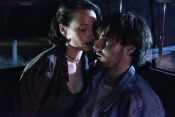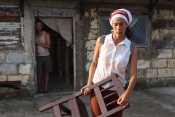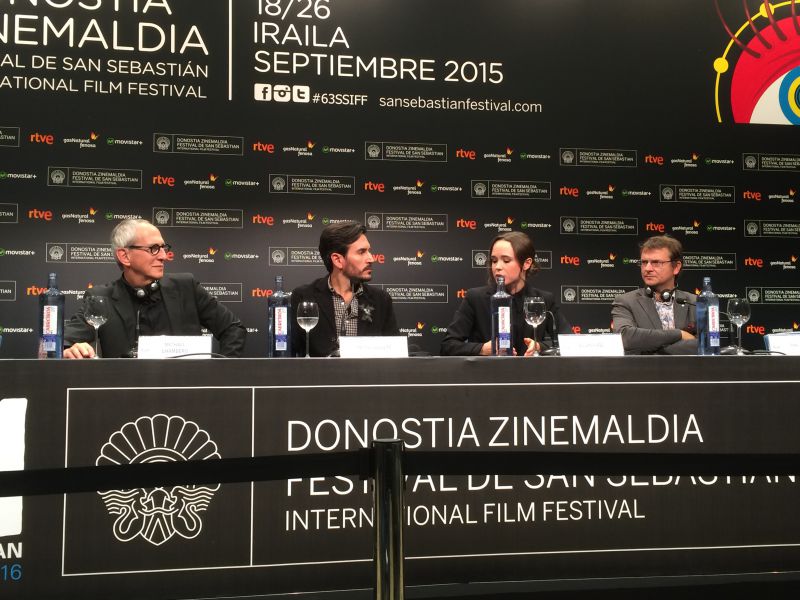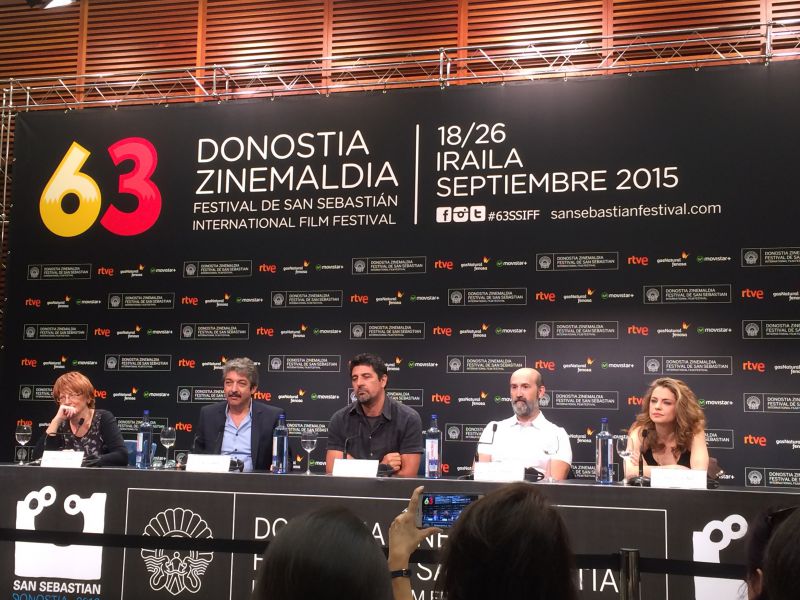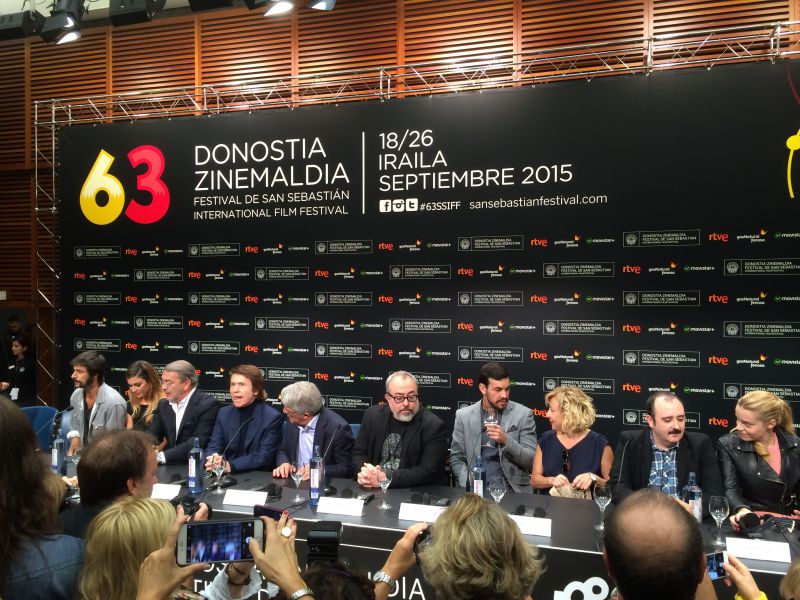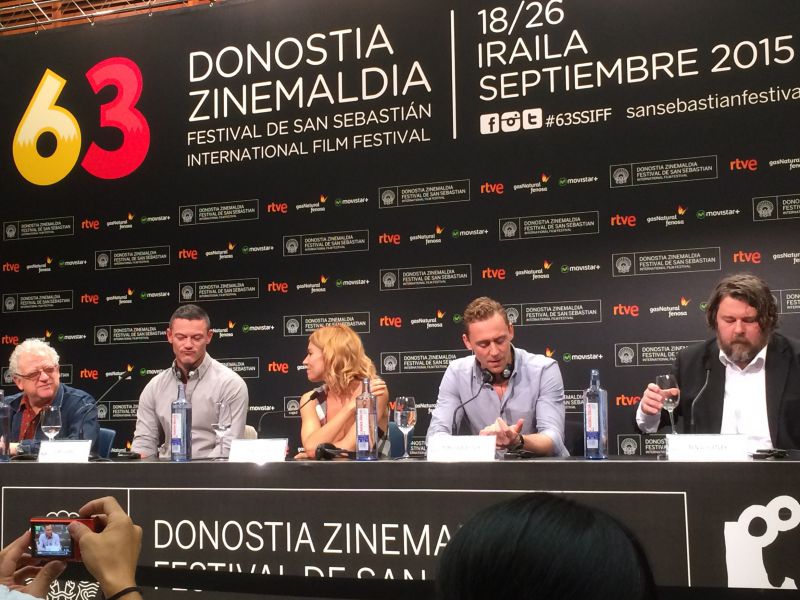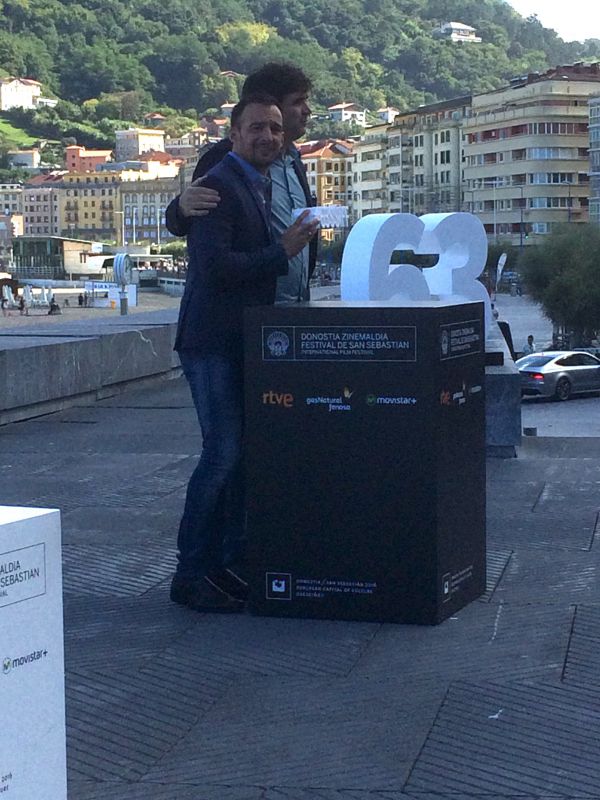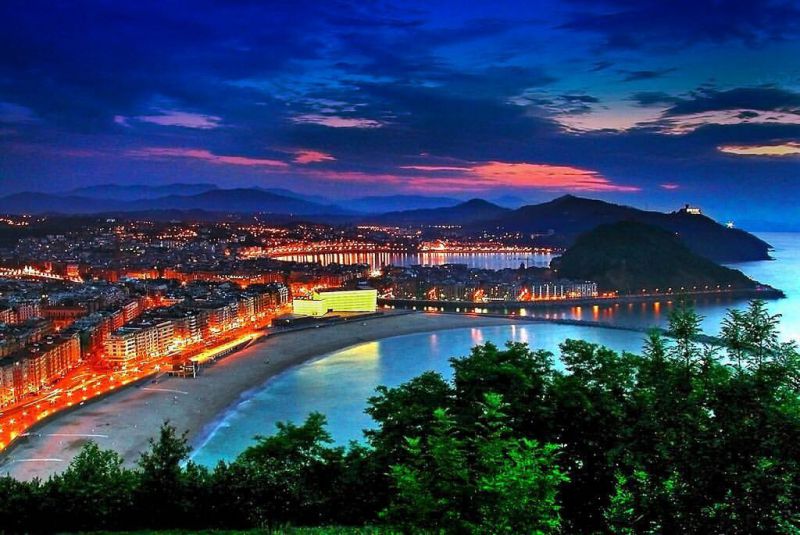Pro Tools
FILMFESTIVALS | 24/7 world wide coverage
Welcome !
Enjoy the best of both worlds: Film & Festival News, exploring the best of the film festivals community.
Launched in 1995, relentlessly connecting films to festivals, documenting and promoting festivals worldwide.
Working on an upgrade soon.
For collaboration, editorial contributions, or publicity, please send us an email here.
|
The competitors for the Horizontes Award
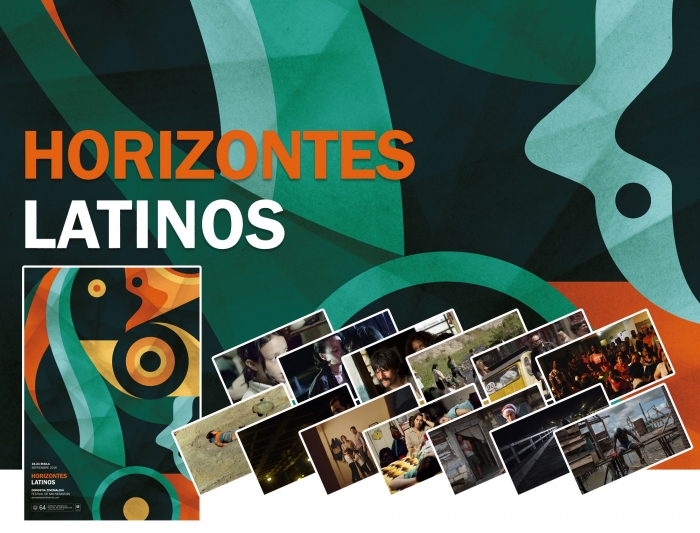
Juan Andrés Arango, Daniel Burman, Amat Escalante, Alejandro Fernández Almendras, Carlos Lechuga and Christopher Murray, among the competitors for the Horizontes Award
Five former participants in last year’s Films in Progress will this year feature in the selection of the best in Latin American cinema
The Horizontes Latino selection, consisting of feature films not yet screened in Spain, produced totally or partially in Latin America, is made up of thirteen films, half of which are related to previous editions of the San Sebastian Festival: four participated in Films in Progress 28 at San Sebastian (with a fifth in Toulouse 29) and another in the Europe-Latin America Co-production Forum, while the short by one of the directors won first prize at last year's International Film Students Meeting.
The Brazilian, French and Spanish co-production Era o Hotel Cambridge (The Cambridge Squatter) helmed by Eliane Caffé (Sao Paulo, 1961), narrating the tale of a group of refugees who join homeless migrants in occupying an old abandoned building in Sao Paulo, carried off the Films in Progress Industry Award last year in San Sebastian.
Also part of the same section, which has the aim to promote the completion of films at the post-production stage, was the fourth feature film by Alejandro Fernández Almendras, Aquí no ha pasado nada (Much Ado About Nothing).Starring a solitary and foolhardy young boy who becomes the main suspect of a hit-and-run accident, the film premiered at Sundance, picking up the FIPRESCI Prize at the Cartagena de Indias Festival. The debut by Fernández Almendras, Huacho (2009), premiered at the Cannes Critics’ Week and participated in Horizontes Latinos; the second, Sentados frente al fuego (By the Fire, 2011), was part of Films in Progress 21 and competed for the Kutxa-New Directors Award; while his third work, Matar a un hombre (To Kill a Man) after participating in Films in Progress 24 and Horizontes Latinos, obtained the Jury Grand Prix at Sundance and was selected to represent Chile at the Goya and Academy Awards. This year, the Chilean filmmaker will participate in the V Europe-Latin America Co-production Forum with his latest project, Una periodista.
For its part, El Amparo was selected for Films in Progress 2015 with the title Sobrevivientes. This is the second film by its director Rober Calzadilla, also an actor and screenwriter, following El país de abril (2013). El Amparo stands on the border between Venezuela and Colombia, where two survivors of an attack are accused by the army of being guerrilla fighters.
Pepa San Martín, who has a recognised track record in shorts, takes her first steps in the field of feature films with Rara, a tale also carrying the Films in Progress stamp, taking its inspiration from a Chilean judge who lost the custody of her children due to her sexual orientation, told from the point of view of her eldest daughter, Sara, aged thirteen. The film, premiered at the Berlinale, follows the story of a family told in a maze of lawyers, courts, lawsuits, plaintiffs and victims.
Last year’s Films in Progress 27 Toulouse also saw the participation of El Cristo ciego (The Blind Christ), second feature film by Christopher Murray (Santiago de Chile, 1985), programmed to compete in Venice, about a man who claims to have had a divine revelation and decides to set out on a pilgrimage with the mission of achieving a miracle: to save a childhood friend, victim of an accident.
La idea de un lago (The Idea of a Lake, formerly Pozo de Aire) is the second feature by Milagros Mumenthaler (La Falda, Córdoba, Argentina, 1977), following Abrir puertas y ventanas (Open Doors, Open Windows,2011), winner, among others of Best Film at Locarno, and of the FIPRESCI Prize in her country. La idea de un lago (The Idea of a Lake) is a co-production between Argentina, Switzerland and Qatar which, after its participation in the Europe-Latin America Co-production Forum in 2013, went on to form part of the Swiss festival’s official selection. The film tells the tale of a photographer whose work on an album prompts her to explore her past.
The short by Kiro Russo Nueva vida won first prize at last year’s International Film Students Meeting. His first feature film, Viejo Calavera, recently awarded at Locarno with a Special Mention in the Cineasti del Presente section. Russo is also presently participating in the programme providing support to audiovisual projects, Ikusmira Berriak, promoted by the Festival, Tabakalera-International Centre for Contemporary Culture and San Sebastian European Capital of Culture 2016, with the collaboration of Filmoteca Vasca and Donostia Kultura.
Also coming from an outstanding short film background, the moviemaker and screenwriter Ana Cristina Barragán (Ecuador, 1987) signs her first feature film, Alba, starring an eleven year old girl obliged as a result of her mother’s illness to move in with her father, a man she barely knows. Alba won the Lions Award in Rotterdam.
Best Director Award in Cannes for Heli, Amat Escalante will premiere in the official competition in Venice his first feature, La región salvaje (The Untamed), which plays with a meteorite, a young couple in crisis and a mysterious woman. The film’s director of cinematography, Manuel Alberto Claro, has worked on the latest films by the Danish moviemaker Lars von Trier, Melancholia, Nymphomaniac. Volume 1 and Nymphomaniac. Volume 2. La región salvaje is the third film by Escalante, selected for Horizontes Latinos, coming after Sangre and Heli, which can be seen in this year’s thematic retrospective: The Act of Killing. Cinema and global violence.
Screenwriter and director, Carlos Lechuga debuted with Melaza, premiered at Rotterdam and acknowledged with numerous awards including Best Film at the Malaga Festival in 2013. In Santa y Andrés (Santa & Andres) he follows three days in the life of a 60 year old homosexual writer watched over under Cuban Government orders by a peasant woman aged 30.
In the film by Juan Andrés Arango we can hear Spanish, French, English, Tagalog and Mazahua being spoken to tell the tale of three teenagers who despite living in different contexts share a feeling of mourning and the need for it not to consume them. X Quinientos, his second film after La Playa D.C. (2012), participated in the Co-production Forum in 2014.
The two films in this year’s Horizontes Latinos with one single country in their production come from Argentina. El rey del once (The Tenth Man) is the twelfth feature film helmed by Daniel Burman, whose career includes a Silver Bear at the Berlinale, FIPRESCI Prize at the Seminci and the Robert Bresson Award in Venice, among other accolades. El nido vacío (Empty Nest, 2008) competed in San Sebastian’s Official Selection and won two awards: Silver Shell for Best Actor (Oscar Martínez) and Best Cinematography. The author of El abrazo partido (Lost Embrace, Made in Spain, 2004), directs a comedy of errors and encounters looking at the impossibility of shaking off the past, premiered in the Berlinale’s Special Panorama section and winner of the Jury Prize at Tribeca.
For his part, Francisco Márquez (Buenos Aires, 1981), author of the short film Imágenes para antes de la guerra, and Andrea Testa (Buenos Aires, 1987), author of the short Un Dos Tres, who met while studying at the ENERC (National School of Film Experimentation and Production in the Argentinian capital), bring us their feature directorial debut La larga noche de Francisco Sanctis (The Long Night of Francisco Sanctis). Presented in Un Certain Regard at Cannes, the film centred on an office clerk who leads a routine, family life, who must decide whether or not to become involved in saving the lives of two people unknown to him who are about to be kidnapped by the army under the orders of the dictatorship.
All of the films in the section will compete for the Horizontes Award, coming with 35,000 euros for the director and distributor of the film in Spain. Films participating in Horizontes Latinos which are the first or second works by their director will also compete for the EROSKI Youth Award, decided by a jury of 300 young students.
|
|
|
|
|
Alba
Ana Cristina Barragán (Ecuador - Mexico - Greece)
Eleven year old Alba has to go and live with her father Igor when her mother falls ill. Igor is a lonely man who shut himself away in a small house after separating from the family. Their life together is almost unbearable for Alba; her father reminds her of everything she doesn't like about herself.
|
|
|
|
|
|
|
|
|
|
Aquí no ha pasado nada (Much Ado About Nothing)
Alejandro Fernández Almendras (Chile - USA - France)
Vicente is a young, reckless loner who returns to his parents' beach house after a year studying in LA. One night of downing shots and chasing girls changes his life forever when Vicente becomes the prime suspect in a hit-and-run accident resulting in the death of a local fisherman. Vicente was wasted. His memories are a blur. Yes, he was in the car, but he swears he wasn't driving. And what's worse, the guy he remembers being behind the wheel is the son of a powerful politician.
|
|
|
|
|
|
|
|
|
|
El amparo
Rober Calzadilla (Venezuela - Colombia)
On the border of Venezuela with Colombia, during the late 80's, two men survive an armed assault in the channels of the Arauca River, in which fourteen of their companions we murdered in the act. The Army accuses them of being guerrilla fighters and tries via intimidation to seize them from the cell where they are being watched over by the local police officer and by the village population, who are desperate to prevent them from being taken away. They say they are simple fishermen, but pressure to yield to the official version is overwhelming.
|
|
|
|
|
|
|
|
|
|
El Cristo ciego (The Blind Christ)
Christopher Murray (Chile - France)
Michael (30) is a mechanic who claims to have experienced a divine revelation in the desert. But far from believing him, the locals treat him like the village madman. One afternoon he learns that a childhood friend has had an accident in a distant town. Michael decides to leave everything he has to set out on a barefoot pilgrimage and cure him with a miracle. His walk begins to attract the attention of people exploited by the mining companies and drug addicts, who see him as a Christ capable of alleviating the harsh reality of the Chilean desert.
|
|
|
|
|
|
|
|
|
|
El rey del Once (The Tenth Man)
Daniel Burman (Argentina)
Ariel thought he had left his past behind after building a new and successful life for himself as an economist in New York. Summoned by his father, whose mission in life is to manage a Judish aid foundation in the Once district, he returns to Buenos Aires. There he meets Eva, a mute and intriguing woman who works at the foundation. The visit coincides with the Jewish Purim festival, an occasion for celebration which provides the undertone of a comedy of errors, meetings and reflection on how we can’t always leave our past behind.
|
|
|
|
|
|
|
|
|
|
Era o Hotel Cambridge
Eliane Caffé (Brazil - France - Spain)
Refugees recently arrived in Brazil who, together with homeless migrants, occupy an old abandoned building in downtown São Paulo. Daily dramas, comical situations and different views on the world commingle with the threat of impending eviction.
|
|
|
|
|
|
|
|
|
|
La idea de un lago (The Idea of a Lake)
Milagros Mumenthaler (Argentina - Switzerland - Qatar)
Inés, a professional photographer, is determined to finish her latest book before the birth of her son. Memory, souvenirs and this photographic work bring us back, time and again, to a same place: the family home in Southern Argentina. This is a space that marked her life and forged her personality over the years. The only photograph she has with her father was taken there when Inés was barely two years old. A few months after the picture was taken he would disappear, a victim of the military dictatorship.
|
|
|
|
|
|
|
|
|
|
La larga noche de Francisco Sanctis (The Long Night of Francisco Sanctis)
Francisco Márquez, Andrea Testa (Argentina)
Buenos Aires, 1977. Francisco, an office clerk who leads an eventless life with his wife and two children, receives information from an old friend about the upcoming kidnapping of two people by the soldiers of the dictatorship. Now he must decide whether or not to risk his life to safe those of two people he has never met.
|
|
|
|
|
|
|
|
|
|
La región salvaje (The Untamed)
Amat Escalante (Mexico - Denmark - France - Germany - Norway - Switzerland)
Young mother Alejandra is a working housewife, raising two boys with her husband Angel in a small city. Her brother Fabien works as a nurse in a local hospital. Their provincial lives are upset with the arrival of the mysterious Veronica. Sex and love can be fragile in certain regions where strong family values, hypocrisy, homophobia and male chauvinism exist. Veronica convinces them that in the nearby woods, inside an isolated cabin, dwells something not of this world that could be the answer to all of their problems.
|
|
|
|
|
|
|
|
|
|
Rara
Pepa San Martin (Chile - Argentina)
Since their parents split up, Sara and her younger sister live with their mother, whose new partner is a woman. Everyday life for the four of them is very similar to that of other families. But not everyone sees it that way. Her father in particular has his doubts.
|
|
|
|
|
|
|
|
|
|
Santa y Andrés (Santa & Andres)
Carlos Lechuga (Cuba - France - Colombia)
Cuba, 1983. Santa, a lonely country girl, is sent to keep an eye on Andrés, a gay writer in whom the Revolution has little “confidence”. Gradually these two people, apparently so very different from one another, realise that the things that bring them together are more important than those that separate them.
|
|
|
|
|
|
|
|
|
|
Viejo Calavera (Dark Skull)
Kiro Russo (Bolivia - Qatar )
Elder Mamani's father has died, but he doesn’t seem to care. He still hogs the limelight at karaoke, in the streets, and gets into trouble. But no one wants to look after him any more, leaving him no other option but to replace his father down the bloody mine.
|
|
|
|
|
|
|
|
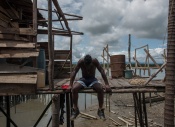
© Alejandro Arango
|
|
|
X Quinientos
Juan Andrés Arango (Canada - Colombia - Mexico)
Coming to Montreal from Manila to live with her grandmother, Maria struggles to adapt to the new environment. Alex, a young Afro-Colombian boy, is deported from the USA to Colombia only to find that his former district is now run by criminals. David leaves his town when his father dies to seek a better future in Mexico City. X Quinientos follows the lives of these three teens in different American cities as they make their way along the same path of pain, migration and transformation.
|
|
|
|
|
|
|
 Barreda de Biurrun Inés
Barreda de Biurrun Inés 



















